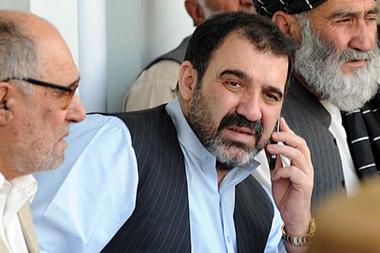By Ryan Grim
President Hamid Karzai has repeatedly released well-connected officials convicted of or charged with drug trafficking in Afghanistan, frustrating efforts to combat corruption and providing additional evidence that the United States' top ally in the country is himself corrupt.
"On numerous occasions we have emphasized with Attorney General Aloko the need to end interventions by him and President Karzai, who both authorize the release of detainees pre-trial and allow dangerous individuals to go free or re-enter the battlefield without ever facing an Afghan court," reads a diplomatic cable obtained by WikiLeaks and provided to The New York Times. "Despite our complaints and expressions of concern to the [government], pre-trial releases continue."

The Huffington Post, Dec. 27, 2010: Another cable notes the difficulty of cleaning up the corruption. "While we must deal with AWK" - Karzai's brother - "as the head of the Provincial Council, he is widely understood to be corrupt and a narcotics trafficker," says one diplomat.
Karzai's ability to release prisoners comes from the transfer of detainees from the Bagram Theatre Internment Facility to the Afghan National Detention Facility, according to the cables. The transfers began in 2007, a year that saw one prisoner released pre-trial. In 2008, Karzai released 104. Halfway through 2009, when one cable was written, he had released 45 already.
The cables paint a portrait of a leader determined to free drug traffickers:
Karzai pardoned five border policemen caught and convicted of possessing 124 kilograms of heroin, which they had stashed in their government-issued, U.S.-funded vehicle. Karzai pardoned them, according to one cable, on the grounds that they were distantly related to two individuals who had been martyred during the civil war.
Karzai also "tampered with" the case of Haji Amanullah, whose father is described as "a wealthy businessman and one of [Karzai's] supporters."
"Without any constitutional authority, Karzai ordered the police to conduct a second investigation, which resulted in the conclusion that the defendant had been framed," the cable reports.
Another cable notes the difficulty of cleaning up the corruption. "While we must deal with AWK" - Karzai's brother - "as the head of the Provincial Council, he is widely understood to be corrupt and a narcotics trafficker," says one diplomat.
Karzai's frequent interventions have undermined public trust in the judicial system -- such as there is one. Former Kabul Mayor Abdul Ahad Sahebi's fate is one instance of unproven Karzai interference that the public blames him for regardless, says a third cable. "The ex-mayor's December 7 conviction and almost immediate release from jail on bail pending appeal generated a media frenzy and intense speculation over President Karzai's role in Sahebi's release," the cable says.
The list of Karzai's interventions goes on: "In another case, a CJTF investigation concluded that 26 kilograms of heroin seized from a vehicle search belonged to Col. Jaweed, Chief of the Highway Police for Badakshan Province. Jaweed is the nephew of a powerful member of Parliament. Eventually, he was arrested and is currently serving in Pol-i-Charkhi prison. But, there is credible, but unconfirmed, intelligence indicating that President Karzai has signed a letter pardoning Jaweed that has not yet been delivered to the Supreme Court," warns a cable.
Karzai is also considering releasing a top Drug Enforcement Administration target, the cable suggests. "Unconfirmed intelligence also indicates that President Karzai is planning to release drug trafficker Ismal Safed, who is serving a 19-year sentence in Pol-i-Charkhi. Safed is a priority DEA target who was arrested in 2005 in possession of large quantities of heroin and a cache of weapons. In 2008, DEA conducted an operation in which an undercover officer purchased approximately three kilograms of heroin directly from Safed," reports the cable, noting that a person close to Karzai insists the release is not planned.
One diplomat's cable sums up the situation: "The meeting with [Karzai's brother] highlights one of our major challenges in Afghanistan: how to fight corruption and connect the people to their government, when the key government officials are themselves corrupt."
Ryan Grim is the author of This Is Your Country On Drugs: The Secret History of Getting High in America
Published on December 27, 2010



